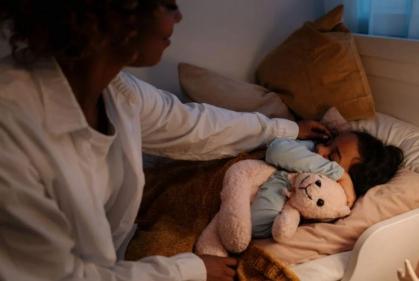Nightmares are bad dreams that can cause children to wake in fear and distress. Your child might have nightmares about:
- A realistic danger, such as an aggressive dog, shark or spider
- Imaginary fears, such as monsters.
Depending on your child’s language ability, they can often recall the content of a bad dream in detail. Some young children might find it difficult to get back to sleep after having a nightmare.Children often wake tearful and upset after a nightmare. They will look for comfort from you but as your child gets older, they will get better at understanding that a dream is just a dream.By seven, your child will be able to deal with nightmares without calling out to you to comfort him.
Tips for dealing with nightmares
If your child wakes up as a result of a nightmare, explain that it was only a bad dream. Reassure your child that everything is OK and safe. A kiss and a cuddle might also help your child settle again.If your preschool-aged child has dreamed about monsters, you could try explaining that they are only make-believe. Explain that made-up things might be scary, but they can’t really hurt children. Avoid making fun of the nightmare or saying your child is silly for worrying. Nightmares can seem very real to little children.If your child talks about a nightmare the next day, be patient. Listen to your child’s worries – don’t dismiss or downplay them. But if your child seems to have forgotten all about a nightmare, it’s probably best not to raise the topic.If you notice a recurrent nightmare, explore sources of stress or fright in your child’s day. You might gently ask your child about encounters with other children, television shows or other daytime experiences. If you can work out the source of the nightmares, you can take measures to eliminate or reduce your child’s exposure to the disturbing events.
Causes of nightmares
The occasional nightmare is not a sign of emotional disturbance and need not be cause for concern. In fact, nightmares are often the product of a vivid imagination.However, if your child is dreaming about the same or similar things over and over again (a recurrent nightmare), or the content of the dream is particularly disturbing, he might be experiencing some kind of stress during the day.Trauma can also cause nightmares. If a child has experienced some type of trauma, she might have nightmares about it for several weeks or months afterwards.
Getting help
It can be a good idea to seek professional advice if your child is experiencing nightmares coupled with high levels of anxiety during the day. Also, seek help if nightmares are part of your child’s response to a traumatic event.












